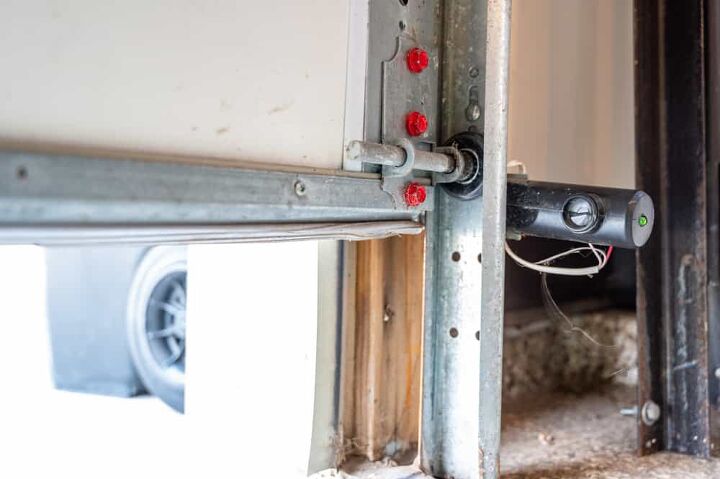Garage Door Sensor's Yellow Light? (Here's What It Means)

Garage doors are known for being technologically advanced these days, particularly if they’re automated. If you own one, you might notice that one door sensor is a golden yellow in color, while another is green. Sometimes, the yellow light might turn off. Other times, the green one will. If you’re like me, you’re probably wondering what the yellow light is and what it should be doing.
Whether or not you have a garage door with a yellow light is determined by the brand of door you have. Craftsman, Chamberlain, and Liftmaster garage doors all have one. Your garage door’s transmitter is linked to the yellow light and it should be on at all times. If it’s not, then you should fix it as it may indicate an issue with your sensors.
Your garage door sensor is there as a major safety measure. Having a transmitter that isn’t sending the right signals to your receiver is a big deal, and can turn your door into a hazard. This guide will tell you how to make the most of your repair time.
Do You Need a Garage Door Repair Service?
Get free, zero-commitment quotes from pro contractors near you.

What Is The Yellow Light On My Garage Door Sensor?
A yellow or amber light is a sign that your garage door has a transmitter that is currently in use. It’s sending a beam across to the other side of the garage door.
On the other side is a green light, which is a signal showing our receiver. This, too, should be on all the time. If you don’t see a beam across your garage door level, something is not quite right.
From here, you can figure out what’s going on with your sensors. So, let’s start troubleshooting.
Troubleshooting Your Garage Door Yellow Light
If you’re noticing something awry with your yellow garage door light, it’s time to do a little troubleshooting. Here’s how you can figure out what’s up with your light and what needs to be done.
Uneven/Poorly Maintained Garage Door Sensors
A common issue with your yellow light could be due to uneven garage door sensors, or sensors that are poorly maintained. This is a quick fix.
- Start by measuring the distance from your receiver to the floor. It should be six inches. If it’s not, note the measurement. Then, measure the distance from your transmitter to the floor. It should be the same distance as your receiver.
- If your receiver and transmitter aren’t aligned, realign them. You can usually do this by taking a wrench, loosening the nuts, and tightening them at an even distance. It might take a couple of tries, but it’ll work pretty well. This will hopefully make sure that you see the beam and that your yellow light stays on.
- Remove any dust and spiderwebs that could be blocking the lights. A quick dusting will let you see a beam if you don’t see one yet.
Faulty Wiring
If you have even garage door sensors, there are other reasons why you might not see a yellow light. One of the more common reasons is frayed or broken wiring—often due to pests chewing on them.
To check for this, take a look at the wires leading up to the transmitter and see if you notice fraying, corrosion or disconnection.
If you spot bad wiring, turn off your garage door opener and call an electrician. This is the fastest way to make sure it’s fixed. If it’s a minor disconnection or fraying point, you can usually fix it with electrical tape or a wire replacement.
Failed Sensors/Garage Door Opener
Did you have your garage door opener for a long time? If so, there’s a good chance that you might have sensors that just went bad.
In many situations, you could have sensor eyes that aren’t working or just sensors that stopped registering signals for one reason or another. The first thing you should do is replace your sensors to see if that fixes the problem.
If a sensor replacement didn’t work, there is a chance that you have a logic board failure in your garage door system. This means that the computer part of your garage door is no longer sending signals that your system needs in order to function. Should this occur, a full replacement is the best possible thing.
Does Your Yellow Garage Light Need To Work?
Since 1993, there has been a federal law requiring all automated garage doors to have a sensor system that can prevent accidents from happening.
Those sensors are there so that your garage door can be alerted if someone falls underneath the door as it’s closing. In the past, garage door accidents happened fairly frequently with small kids as a result of parents being unable to notice them crawling near the door.
Not having working garage door sensors on a motorized door is a federal building code violation. In most HOAs, council members can also write you up if you don’t have working sensors. So, even if you don’t use the motorized garage door opener too often, it’s absolutely worth a fix.
Besides, most garage door opener models won’t even work without the sensor beam being on. (You can read more about why garage doors won’t function without sensors here.) So, there’s that issue, too.
How Much Do Garage Door Sensors Cost?
If you need to do a replacement for your sensors, you are going to have to pay for a new pair of sensors. This, in and of itself, won’t cost too much.
Most garage door sensors cost between $75 to $95 to be installed on your own. If you want to pay for a professional to install your sensors for you, that will cost around $170.
In some cases, it might still be cheaper to have a repairman fix your sensors for you. Sensor repairs can range from $65 to $75 in most situations. If the cost is fairly even between replacement and repair, it’s usually better to just get a new set of sensors.
How Much Does A Garage Door Opener Replacement Cost?
Let’s say that it isn’t just the sensors that went bad. In some rare cases, your garage door opener system could be what truly acts as the culprit for a nonfunctional yellow garage light.
A garage door opener replacement will cost between $150 to $550 for parts, plus $75 to $85 per hour for labor. This leads to an average cost of $353 nationwide.
What If My Garage Door Sensors Don’t Have A Yellow Light?
A lack of a yellow light doesn’t mean you don’t have a transmitter sensor. With other brands, the transmitter sensor can be red or green. Here’s what you need to know about the major brands:
- Genie and Overhead both use red as a transmitter light. Oddly enough, receiver lights tend to be red with these brands, too.
- Marantec has a solid green light for the transmitter. Its receiver lights are red.
- Guardian has a solid green light, but can blink when there is an obstruction in the way. This is a quick and easy way to diagnose the problem with your sensor. The receiver on Guardian systems is a solid red.
- Third-party garage door opener systems are best evaluated on a case by case basis. Most of the time, you will find out what your lights’ colors will be from the user manual. If you are worried that you won’t be able to tell one light from the other, stick to a name brand garage sensor pair.
What Color Should The Lights Be On Garage Door Sensors?
What color should garage door sensors’ lights be? The sending and receiving lights should be yellow and green, respectively.
You’ll also need to look at the light on the motor unit to figure out what’s causing the issue. Know the reason first, and only then can you solve it on your own or with the help of professionals.
Do You Need a Garage Door Repair Service?
Get free, zero-commitment quotes from pro contractors near you.

Related Questions
Do you have to have a garage door sensor as part of your garage door opener system?
Technically, you need to have something that includes a safety-reversing system as part of your garage door. This is a federal law that was passed in 1993, which means that no state can override this safety recommendation.Most of the time, the easiest way to make sure you have a safety mechanism that fits the regulatory requirements is to get a safety sensor set.However, there are some options that are available that still maintain the code properly. Unfortunately, these vary from place to place. To find out what substitutes you are allotted in your area, ask your local town planning office.
What’s the easiest way to bypass garage door sensors?
If you don’t want to deal with all the hassle that comes with sensors, the easiest way to bypass it is to step high above the sensor beam light.If the light doesn’t get tripped, the garage door will not act. You can also disconnect the garage door opener system from the garage door, if you want to make sure that you don’t trip anything for a prolonged period of time.Due to the mandates regarding sensors, you can’t manually override them in most cases. Sorry folks!
How long should you expect garage door sensors to last?
Garage door sensors are sturdy, but they’re not as sturdy as the overall garage door opener system you may have had. A typical garage door sensor will only last between three to five years, depending on how frequently it is used.
Related Guides

Ossiana Tepfenhart is an expert writer, focusing on interior design and general home tips. Writing is her life, and it's what she does best. Her interests include art and real estate investments.
More by Ossiana Tepfenhart



























